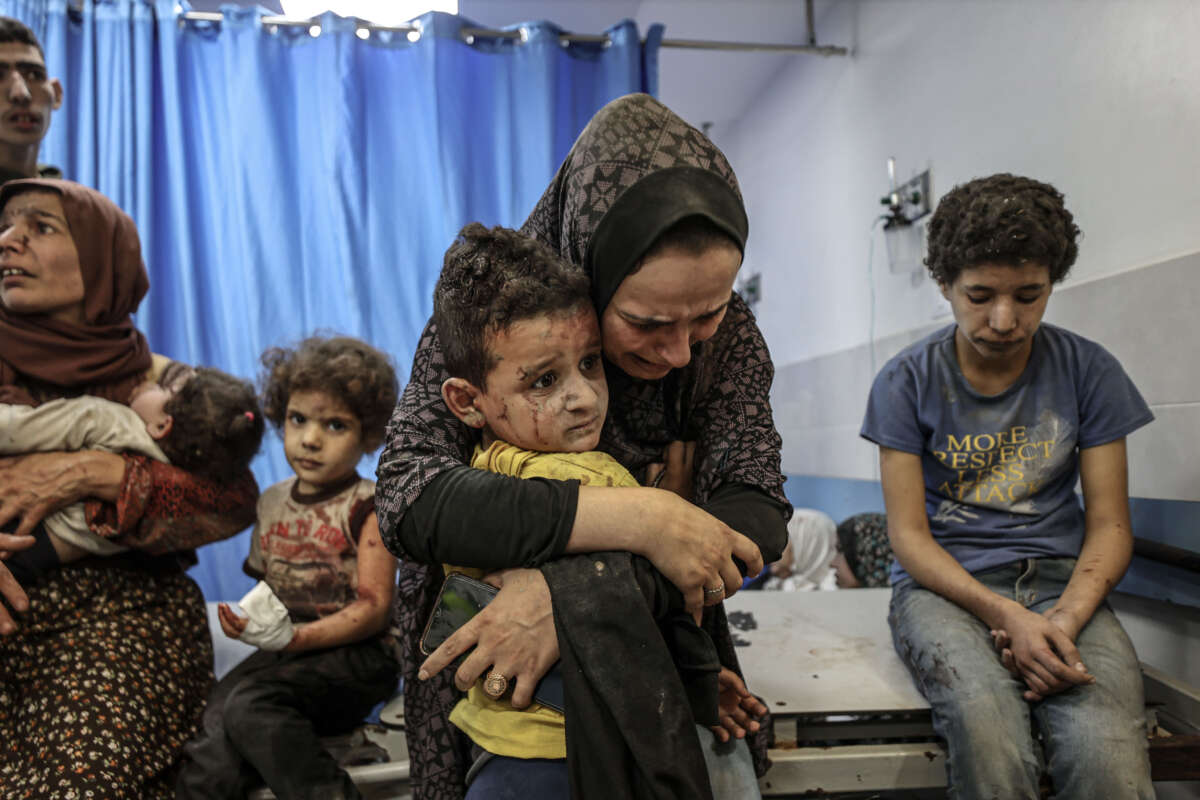Israeli forces intensified their attacks on Gaza hospitals this weekend, Gaza officials and aid groups are reporting, as health providers and thousands of patients are stuck in hospitals that are no longer operational due to Israel’s blockade on electricity and fuel.
Israel’s blockade forced Al-Shifa Hospital, the largest hospital in Gaza City, to go out of service on Saturday morning, Palestinian officials said, with the facility going dark due to the lack of electricity. Israeli forces have been closing in on hospitals in Gaza City, with the director of al-Shifa saying that they are “launching a war” on the hospitals in the area; bombardments and fighting in the immediate vicinity of al-Shifa have left care workers, patients and those taking shelter in and around the facility trapped.
At least six newborn babies who had to be taken off their incubators at al-Shifa have died as of Monday, according to the Gaza Health Ministry, with at least 30 others still at risk as doctors are forced to perform manual respiration on the babies to keep them alive. Doctors have said that the babies are likely to die as long as the electricity is out. The blockade has also forced dozens of patients on dialysis to be taken off the treatment, health officials say, meaning that they will likely die within days.
There are still at least 600 patients and between 200 and 500 health workers in al-Shifa, as well as at least 1,500 displaced people taking shelter, according to an update from the World Health Organization (WHO) Palestinian office based on data from the Palestinian health ministry. The ministry says that workers have had to take increasingly desperate actions after Israeli forces shot live ammunition through the windows of the hospital, moving patients to the corridors of the hospital.
Those still inside are trapped, the WHO reported, as workers and the health ministry have said that Israeli forces have been carrying out heavy strikes outside of the hospital. “There is no safe passage out of the hospital,” the WHO wrote. Earlier this month, Israeli forces bombed an ambulance convoy at the entrance of al-Shifa as health and aid organization workers tried to evacuate patients.
“It’s not safe to move out and it’s not safe to stay. We don’t know what to do. Please help us,” Nidal Abu Hadrous, a doctor at al-Shifa, told NBC.
“Personally, we are collapsing,” Abu Hadrous continued. “I’m not sure how many days more we will be able to survive … I don’t believe in humanity anymore. I don’t believe in all these special committees and organizations anymore. Nobody is taking care of us. This is unbelievable. I have no words.”
There are hundreds of bodies lining the corridors of al-Shifa, while yet more bodies lay outside. Though the decomposing bodies constitute a health risk, health workers are left with little choice, as the outside and even parts of the inside of the hospital are unsafe due to Israeli attacks.
Israeli officials have denied attacking hospitals in Gaza, but have also been laying the groundwork for weeks to supposedly justify attacking al-Shifa and other hospitals, claiming that Hamas is conducting operations in tunnels under the hospital. And, at the same time, Israel has been taking responsibility for some strikes on and around hospitals.
Al-Quds Hospital, the second largest in the region, is also no longer operational as of this weekend due to a fuel shortage, with workers and patients also seemingly trapped inside. With the two major hospitals closed, Palestinians wounded in other Israeli attacks — like firefights outside of al-Quds — are unable to seek care. Officials at al-Aqsa Martyrs Hospital, in central Gaza, have also warned that it is running out of power and that babies in incubators and dialysis patients there are at risk.
Meanwhile, Israeli forces carried out 14 raids in the occupied West Bank overnight on Monday — down from the average of 40 raids per night since Israel’s current siege of Gaza began — with forces arresting 50 Palestinians, bringing the total number of Palestinians detained amid Israel’s current ethnic cleansing campaign to over 2,500.
The Palestinian health ministry has reported that Israeli attacks have killed at least 11,078 Palestinians — including at least 4,506 children — since October 7, with another 27,490 injured. Israeli attacks have also killed at least 183 Palestinians in the occupied West Bank.
Our most important fundraising appeal of the year
December is the most critical time of year for Truthout, because our nonprofit news is funded almost entirely by individual donations from readers like you. So before you navigate away, we ask that you take just a second to support Truthout with a tax-deductible donation.
This year is a little different. We are up against a far-reaching, wide-scale attack on press freedom coming from the Trump administration. 2025 was a year of frightening censorship, news industry corporate consolidation, and worsening financial conditions for progressive nonprofits across the board.
We can only resist Trump’s agenda by cultivating a strong base of support. The right-wing mediasphere is funded comfortably by billionaire owners and venture capitalist philanthropists. At Truthout, we have you.
We’ve set an ambitious target for our year-end campaign — a goal of $250,000 to keep up our fight against authoritarianism in 2026. Please take a meaningful action in this fight: make a one-time or monthly donation to Truthout before December 31. If you have the means, please dig deep.
